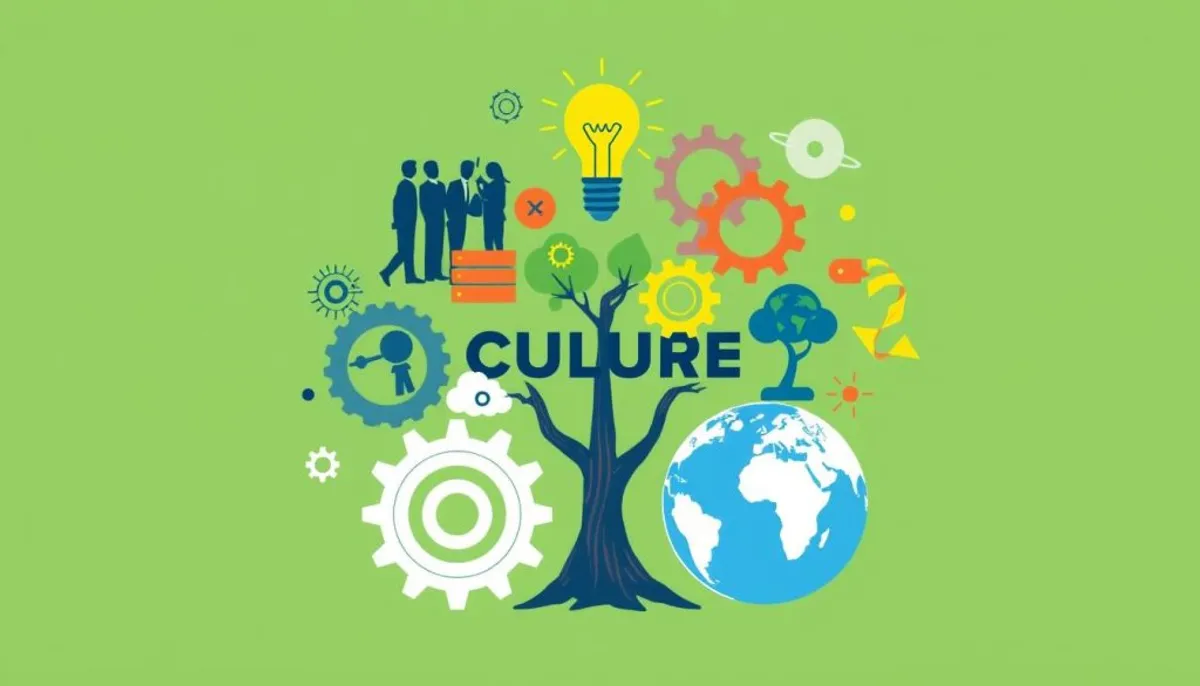
Company culture, a pillar of organizational identity, emerged in France in the 1980s. Its origins lie in American and Japanese culturalism. Today, it is an essential tool for managing and diagnosing businesses.
The history of the company is fundamental in creating its culture. Leading companies like Saint-Gobain employ historians to celebrate their past. In doing so, they reinforce their values and shape a unique identity.
Company culture is complex and manifests through its multiple definitions. Since 1871, over 300 interpretations have been recorded. This diversity highlights the richness of this concept, which includes rites, myths, and a language specific to each organization.
In the face of economic and technological changes, company culture must adapt while maintaining stability. This ability to evolve is essential for maintaining team cohesion and performance. In a constantly changing world, this adaptability is crucial.
History as the Foundation of Company Culture
The history of a company is fundamental to the formation of its culture. It shapes the identity of the organization and guides its evolution. The founders and key moments contribute to creating a unique company legacy.
The Importance of Founders and Historical Leaders
Founders leave an indelible mark on company culture. Their vision and values become the foundation of the organization's identity. At Mercedes-Benz, over 130 years of experience is regularly highlighted during the launch of new products.
Key Moments that Shape Identity
Certain significant events in a company's life define its character. These key moments can include major successes, challenges overcome, or revolutionary innovations. They create narratives that inspire employees and strengthen the culture. Sports clubs like Real Madrid rely on their glorious history to maintain a strong playing culture.
Legacy and the Transmission of Values
The transmission of values is essential for preserving the company legacy. Luxury brands like Chanel or Cartier capitalize on their history and expertise to strengthen cohesion with their employees. At Lexus, master craftsmen Takumi uphold rigorous quality control, contributing to a strong brand image.
The history of a company is not just a recounting of the past. It is a powerful tool for shaping its future, inspiring employees and guiding strategic decisions. By valuing their historical capital, companies create a distinctive culture that sets them apart in the market.
Core Values as Cultural Pillars
Company values form the heart of any organizational culture. They reflect the deep identity of a company and guide daily behaviors. A well-defined value charter is essential for bringing teams together around a shared vision.
A study reveals that 88% of professionals consider a unique culture essential for a company's success. Organizations with strong values are 21% more productive than average. This underscores the direct impact of values on performance.

To be effective, values must translate into concrete organizational rules. For example, a company that values innovation might allocate 20% of time to personal projects. Transparency can be practiced through regular informational meetings.
| Value | Organizational Rule |
|---|---|
| Innovation | 20% of time dedicated to personal projects |
| Transparency | Weekly informational meetings |
| Collaboration | Open workspaces |
Adherence to values begins at recruitment. It is crucial to select candidates aligned with the culture. Continuous training and recognition of exemplary behaviors reinforce the embedding of values in daily life.
How Company Culture is Born
The birth of a company culture is a complex process that evolves over time. It finds its origin in the company's history, often initiated by the founder's vision. Values, practices, and behaviors crystallize through crucial moments, such as the launch of new projects or mergers.
The Cultural Construction Process
The cultural construction of a company is a constantly evolving phenomenon. It manifests through asserted values, management practices, and daily interactions. This process involves collective learning, where the organization develops strategies adapted to the challenges faced.
Internal and External Influencing Factors
Several factors influence company culture. Internal factors include leadership style, HR policies, and organizational structure. External factors encompass the economic environment, market trends, and societal changes.
| Internal Factors | External Factors |
|---|---|
| Leadership Style | Economic Environment |
| HR Policies | Market Trends |
| Organizational Structure | Societal Changes |
The Role of Social Interactions
Social interactions are essential in developing company culture. They promote the transmission of values, the creation of common codes, and the strengthening of bonds among colleagues. These daily exchanges shape the collective identity of the organization.
Company culture transcends a simple name or brand. It is experienced through behaviors, decisions, and professional relationships. Its development requires ongoing commitment from all actors in the organization, from management to employees.
The Essential Components of Organizational Culture
Company culture is shaped by key elements that define its identity and practices. These components influence employee behavior. They contribute to creating a unique work environment.
Rites and Ceremonies
Company rites are essential for reinforcing values and cohesion. They include award ceremonies and annual traditions. These events create moments of sharing and recognition.
They allow for celebrating successes and transmitting the company's history. Thus, they play a crucial role in forming the organization's identity.
Language and Common Codes
Organizational language is a fundamental pillar of company culture. It includes specific terms, acronyms, and expressions unique to the organization. This shared vocabulary facilitates internal communication.
It strengthens employees' sense of belonging. Thus, it contributes to creating a team spirit and cohesion within the organization.
Founding Symbols and Myths
Company symbols, such as logos and slogans, convey the visual identity of the organization. Founding myths tell the story of the company. They highlight its core values.
These elements contribute to forging a strong and distinctive culture. They help create a visual identity and a story that inspires employees, while considering the cultural project budget.

| Component | Example | Impact on Culture |
|---|---|---|
| Rites | Annual employee ceremony | Strengthening cohesion |
| Language | Company-specific acronyms | Facilitating communication |
| Symbols | Company logo | Strong visual identification |
The Role of Socialization and Recruitment
Socialization and cultural recruitment are crucial for shaping company culture. The employee integration process, or onboarding, is essential for transmitting the organization's values. A 2009 study from IAE Lyon showed that integration programs often focus on rapid assimilation rather than creating intergenerational bonds.
Cultural recruitment aims to choose candidates aligned with the company's values. At Waalaxy, most rejected candidates are turned down for a lack of cultural fit rather than skills. This approach highlights the importance of company culture in the selection process.
Onboarding is a crucial step for transmitting culture to new employees. According to a 2012 Dares survey, 50% of new hires considered leaving their company during the trial period. This alarming figure underscores the importance of an effective integration process to retain talent.
- Define company values that are divisive and meaningful
- Involve the team in the definition and iteration of values
- Organize team-building events, like the "Scaleziade" at Scalezia
By adopting these practices, companies can create a strong and coherent culture. This fosters employee engagement and reduces turnover. Employee integration thus becomes a pillar of long-term organizational success.
The Evolution of Culture in Response to Changes
Company culture must constantly adapt to market shifts and technological challenges. A study reveals that 83% of employees consider company culture essential to their job satisfaction. This data underscores the importance of a successful cultural adaptation.
Adapting to Market Changes
In the face of rapid market changes, companies must adjust their culture. However, 70% of change projects fail due to an unsuitable culture. To succeed, organizations must involve their employees in the cultural adaptation process.
Managing Mergers and Acquisitions
Mergers and acquisitions pose a major challenge for company culture. Approximately 70% of change initiatives fail, often due to cultural resistance. A gradual and inclusive approach is crucial for harmonizing cultures during these operations.
The Challenge of Digital Transformation
Digital transformation disrupts traditional working methods. 52% of French people see remote work as a future reality. This evolution requires an adaptation of company culture to integrate flexibility and innovation. Digital tools play a key role in this transition, facilitating communication and cultural adaptation in response to these changes.
RelatedRelated articles


